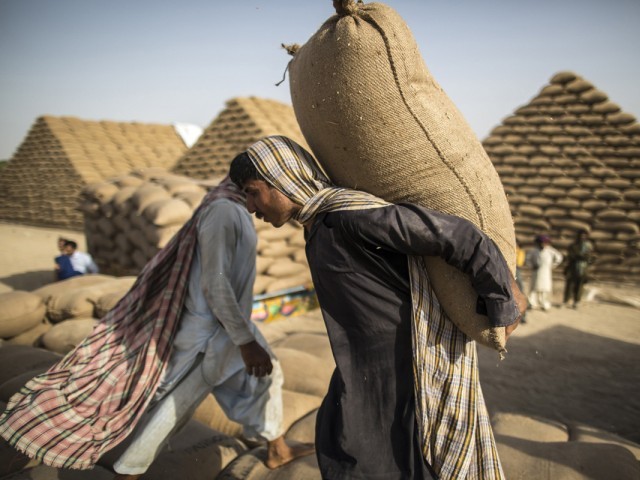
The federal government on Wednesday decided to increase the minimum wheat procurement price by 14.3% to Rs1,600 per 40 kilogrammes and also agreed to give subsidy on fertilisers aimed at increasing farmers’ income.
The decision to increase the prices was taken during a subcommittee meeting of the Economic Coordination Committee (ECC). The subcommittee comprised 10 members, including almost all the members of the ECC.
It has been decided to increase the minimum wheat support price from Rs1,400 to Rs1,600 per kg – an increase of Rs200 or 14.3%, according the officials, who attended the meeting. The rates are for next wheat crop but it will set the trend in the market.
The raise is Rs150 or almost 10% less than what had been proposed by the Ministry of National Food Security and Research to the ECC. But the price of Rs1,600 will be only higher by Rs13 or 0.8% compared to the estimated production cost of Rs1,587 per 40 kgs by the food security ministry. At this price and with an average 28 maunds per-acre output, the farmer will get additional benefit of Rs5,600 per acre.
It was also decided in the meeting that Rs1,000 subsidy would be given on a di-ammonium phosphate (DAP) fertiliser bag, Asad Umar, the minister for planning and development, told The Express Tribune. Umar had moved the subsidy proposal to reduce the input cost of the farmers.
The current rate of DAP is Rs4,100 per bag, which will be reduced by about 25% to give substantial relief to the farmers, said the minister. But the prices will still be about Rs300 per bag higher than the rate prevailing a year ago.
Official estimates showed that the cost of fertilisers accounted for 20% of the total production cost. Land preparation cost was estimated at 10%, seed and sowing operations 15%, harvesting and thrashing 17% and land rent about 39%.
However, the subcommittee was unable to agree on the mechanism for the DAP subsidy. During Asad Umar’s tenure as finance minister, the government had reduced the general sales tax (GST) rate on urea fertiliser to 2%, to directly pass on its impact to the farmers, who were earlier paid indirectly and were prone to misuse.
The proposal of giving DAP subsidy through scratch card and through the food security ministry were also discussed. However, it decided to setup another committee to agree upon a mechanism for giving the DAD subsidy, the official said.
Against the current support price of Rs1,400, the wheat price in the domestic market, as reported by the Pakistan Bureau of Statistics (PBS), stood at Rs2,256.6 per 40 kgs in the first week of October, according to official documents. The prices shot up after the PTI government exported 5.5 million metric tons of wheat and also could not handle the procurement.
The government has decided to increase the support prices to incentivise farmers to produce more crop, as the country, for the first time in over 12 years, faces a shortfall due to its sheer mismanagement.
The food ministry estimated that the current wheat consumption, including seed requirement, at nearly 28 million tons. Its estimates showed that the annual wheat requirement for a projected population of 240 million by 2025 would be over 30 million tons – an increase of 8% in five years.
ECC meeting
After the sub-committee meeting, adviser to Prime Minister on Finance Dr Abdul Hafeez Shaikh chaired the meeting of the ECC. The ECC approved two technical supplementary grants worth Rs17 billion for the ministry of defence for the current financial year.
The Rs16.5 billion were approved for raising Special Security Division, South, to protect the China-Pakistan Economic Corridor (CPEC) projects. The remaining Rs500 million were approved for building community bunkers along the Line of Control (LoC).
The cost of raising the Special Security Division, South, of about 13,000 personnel has been estimated at Rs93 billion over a period of 7 years. The force is being raised for protection of 42 CPEC projects. In the last fiscal year, the government had given Rs11.5 billion over and above the regular defence budget.
The ECC also approved the request of the commerce ministry for inclusion of radiation apparatus in annex-B-1 of the Import Policy Order, 2020. On a summary moved by the industries ministry for ensuring the supply of RLNG to fulfil the requirements of two fertiliser plants – Agritech and Fatima Fertilizer – for the Rabi Season 2020-21, the ECC decided that the supply of RLNG would continue until end-November 2020.
A three-member committee, which was constituted earlier by the ECC, under the chairmanship of the industries minister and comprising members from ministries of finance and food security, would prepare a proposal for the further operation of these plants and then bring it to the ECC for further decision, according to the finance ministry.


















COMMENTS
Comments are moderated and generally will be posted if they are on-topic and not abusive.
For more information, please see our Comments FAQ